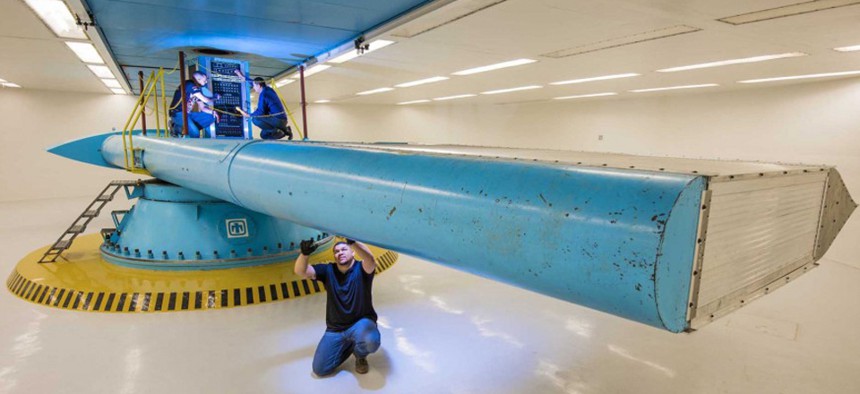
A recently renovated centrifuge used in nuclear weapon assessments at Sandia National Laboratories. The Energy Department branch overseeing the lab is rejecting a finding by congressional auditors that it should know how much money could be saved by enact National Nuclear Security Administration
Nuke Agency Rejects Mandate to Provide Cost-Savings Details
Agency's spending decisions are under the microscope in light of a broader congressional atmosphere of budget-tightening and because of past cost overruns.
The U.S. nuclear weapons agency is rejecting a finding by auditors that it should know how much money it could save by pursuing certain efficiencies.
The National Nuclear Security Administration was required under the fiscal 2012 defense authorization law to issue a report to Capitol Hill examining areas within its enterprise where it could operate more efficiently and save money by doing so. A Thursday report by the Government Accountability Office found that while the agency's assessment -- eventually delivered to lawmakers in November 2013 -- did highlight seven "opportunities for efficiency," it failed to provide estimates on the cost savings that could be realized with those projects.
The semiautonomous Energy Department branch, in its comments to auditors, disputed the finding that it was required under the 2012 legislation to "casually and quantitatively link its cost efficiency initiatives to specific cost savings."
According to the 25-page audit report, the National Nuclear Security Administration had argued it lacked "reliable information to accurately develop cost estimates" for the initiatives it outlined to Congress.
The auditors disagreed with this contention, noting that, while analytically difficult to develop, a "sound methodology for estimated savings helps ensure that proposed savings can be achieved."
The nuclear agency's spending decisions are currently under the microscope in light of a broader congressional atmosphere of budget-tightening and, more specifically, because NNSA officials in recent years have overseen a number of projects that have far exceeded initial cost projections.
One of the efficiency projects the agency outlined in its report to Congress was the planned Uranium Conversion Facility at the Y-12 National Security Complex in Tennessee. That initiative today is in jeopardydue in part to how much its estimated price tag has risen, skyrocketing from initial projections of no more than $1.1 billion to almost $20 billion.
NEXT STORY: 4 Ways Industry Can Help Make the DATA Act Work







